Twelfth Evening – Ba Trụ Pháp Ba La Mật – Three Pillars of Dharma: Parami – Song ngữ
English: Joseph Goldstein.
Việt ngữ: Nguyễn Duy Nhiên.
Compile: Lotus group.
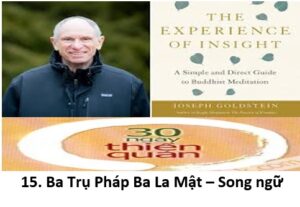
Twelfth Evening – Ba Trụ Pháp: Ba La Mật – Three Pillars of Dharma: Parami
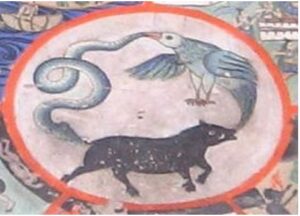
Wheel of samsara (greed, hatred and delusion). Every mind-moment
that is free of greed, hatred and delusion has a certain purifying force in the
flow of consciousness; and in our long evolution, we have accumulated many
of these forces of purity within our minds.
To practice and understand the Dharma is a rare and precious thing. Few people in the world are presented with this opportunity. Most people are circling around, driven by ignorance and desire, unaware of the possibility of getting off this wheel of samsara, the wheel of greed and hatred. Opportunities to practice arise because of something which in the Pali language is called “parami.” Parami means the accumulated force of purity within the mind. Every mind-moment that is free of greed, hatred and delusion has a certain purifying force in the flow of consciousness; and in our long evolution, we have accumulated many of these forces of purity within our minds.
Thực hành và hiểu được Phật pháp là một điều hiếm có và vô cùng quí báu. Rất ít người trên thế giới có được cơ hội này. Ða số còn bị kẹt trong vòng lẩn quẩn, chạy theo lòng tham và sự si mê, không ý thức được rằng mình có khả năng thoát ra khỏi vòng luân hồi, bánh xe của ái dục và sân hận. Cơ hội tu có được là nhờ vào điều mà tiếng Pali gọi là Parami hay là Ba la mật. Ba la mật có nghĩa là sự tích lũy năng lực của một tâm trong sạch. Mỗi khi tâm ta không bị ảnh hưởng bởi tham, sân, si nó sẽ có một năng lực làm cho dòng tâm thức trở nên tinh khiết. Trên hành trình tiến hóa, chúng ta đã tích lũy được khá nhiều năng lực trong sạch này trong tâm.
Sometimes in English this word parami is loosely translated as merit. But that is easily misunderstood as collecting gold stars for good deeds. Rather, parami is the force of purity within the mind. When there is a great accumulation of the factors of non-greed, non-hatred, non-delusion, the paramis become forceful and result in all kinds of happiness, from the worldliest sensual pleasures to the highest happiness of enlightenment. Nothing is happening as an accident, or without cause.
Chữ Parami đôi khi cũng được diễn dịch một cách rộng rãi là phần thưởng, công trạng. Nhưng chúng ta đừng hiểu lầm chúng như là những ngôi sao vàng thưởng cho mỗi việc thiện. Thật ra, Parami có nghĩa là một năng lực trong sạch trong tâm. Khi những yếu tố vô tham, vô sân, vô si được tích lũy đầy đủ, những Parami sẽ trở thành sức mạnh và sanh ra quả hạnh phúc đủ loại, từ những thú vui sắc dục thế gian nhất cho đến sự an lạc giải thoát cao tột nhất. Không có gì trên đời này mà lại xảy ra một cách ngẩu nhiên hay là vô duyên cớ cả.
There are two kinds of parami: purity of conduct and purity of wisdom. The forces of purification involved in right conduct become the cause of happy surroundings, pleasant circumstances, agreeable relationships, and the opportunity to hear the Dharma. For example, the situation of this retreat did not happen by chance. It happened because there were strong forces of purity within each of us.
Có hai loại Ba la mật: sự trong sạch của hành động và sự trong sạch của trí tuệ. Các hành động trong sạch là nhân duyên tạo nên những cảnh vật vui vẻ, hoàn toàn thuận tiện, tình thân thiết và cơ hội để nghe được Phật pháp. Thí dụ, khóa tu này không phải ngẩu nhiên mà xảy ra. Nó có được là nhờ ở sức mạnh của sự trong sạch có trong mỗi người chúng ta.
The other kind of parami, purity of wisdom, develops by practicing right understanding, and it makes possible the growth of insight. Both kinds of paramis, both these forces of purification, have to be developed in order for us to have the chance to practice the Dharma, and then the wisdom to understand.
Loại Ba la bật thứ hai là sự trong sạch của trí tuệ, khai triển được nhờ sự thực tập chánh tư duy. Ba la mật này giúp cho tuệ sáng suốt được tăng trưởng. Cả hai Ba la mật, hai năng lực trong sạch vừa kể, phải được phát triển đầy đủ thì ta mới có cơ hội để tu tập Phật pháp, cũng như có được một trí tuệ để lảnh hội.
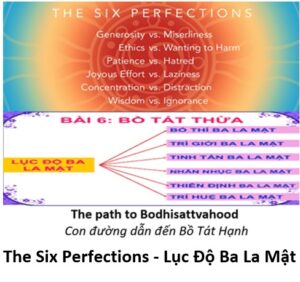
The Six Perfections – Lục Độ Ba La Mật
There are three pillars of Dharma, three fields of action, which cultivate and strengthen the paramis:
Có ba trụ Pháp, ba lãnh vực của hành động giúp vun trồng và củng cố cho các Ba la mật:

Generosity. Giving is the expression in action of the mental
factor of non-greed. The Buddha said that if we knew, as he did, the
fruit of giving, we would not let a single meal pass without sharing.
The first of these is generosity. Giving is the expression in action of the mental factor of non-greed. Non-greed means letting go, not holding on, not grasping, not clinging. Every time we share something, or give something away, it strengthens this wholesome factor, until it becomes a powerful force in the mind. The Buddha said that if we knew, as he did, the fruit of giving, we would not let a single meal pass without sharing.
- Trụ pháp thứ nhất là Bố thí. Bố thí tức là tâm hành vô tham được biểu hiện bằng ra hành động. Vô tham có nghĩa là buông bỏ, không níu kéo, không bám víu. Mỗi khi chúng ta chia xẻ một việc gì, hay cho một vật gì, nó sẽ củng cố thêm cho tâm hành thiện này, và rồi một ngày nó sẽ trở thành một năng lực dũng mạnh trong tâm. Ðức Phật dạy rằng, nếu chúng ta biết được lợi ích của sự bố thí như ngài, ta sẽ không bao giờ để một buổi ăn trôi qua mà không chia xẻ với kẻ khác.
The karmic results of generosity are abundance and deep harmonious relationships with other people. Sharing what we have is a beautiful way of relating to others, and our friendships are much enhanced by the quality of generosity. Even more significantly, the cultivation of non-greed becomes a strong force for liberation. What keeps us bound is desire and grasping in our own minds. As we practice giving, we learn to let go.
Quả trái của nhân bố thí là sự sung túc, đầy đủ và sự hòa hợp với những người chung quanh. Chia xẻ những gì mình có, là một lối cư xử vô cùng tốt đẹp, tình thân hữu sẽ được tăng trưởng nhờ đức tính vị tha của ta. Cao thượng hơn nữa, tâm vô tham có thể là một sức mạnh quan trọng cho sự giải thoát của mình. Chúng ta bị trói buộc là vì lòng tham và sự ái dục trong tâm. Thực hành bố thí tức là ta đang học cách tháo gở và buông bỏ những sợi dây xiềng xích này.

It is said that there are three kinds of givers:
Beggarly, Friendly, and Kingly Giving.
It is said that there are three kinds of givers. The first are beggarly givers. They give only after much hesitation, and then just the leftovers, the worst of what they have. They think, “Should I give, or shouldn’t I? Maybe it’s too much?” And finally, perhaps part with something they don’t really want.
Người ta thường nói có ba hạng người bố thí. Hạng thứ nhất là hạng người bố thí bần cùng. Hạng người này chỉ cho sau khi đã do dự, suy tính rất kỹ, và họ chỉ cho những gì dư thừa, cặn bả của họ. Họ nghĩ: “Mình có nên cho hay không? Có cho nhiều quá không?” Và có lẽ thì cuối cùng họ sẽ cho những gì mà họ cũng không thật sự muốn giữ.
Friendly givers are people who give what they themselves would use. They share what they have and with less deliberation, with more open-handedness.
Hạng thứ hai là hạng người bố thí theo nhân đạo. Hạng người này cho những thứ mà họ cũng có thể cần đến, Họ chia xẻ những gì của họ, mà không tính toán nhiều với một bàn tay rộng mở.
The highest kind of givers are kingly givers who offer the very best of what they have. They share spontaneously and in the moment without needing to deliberate. Giving has become natural to their conduct. Non-greed is so strong in their minds that at every opportunity they share what is treasured most in an easy and loving way.
Hạng cao thượng nhất là hạng bố thí theo vương đạo. Hạng người này sẵn sàng dâng tặng những gì mà họ quý giá nhất. Họ chia xẻ một cách tự nhiên và tức thời, không cần sự cân nhắc. Sự bố thí đã trở thành một thói tự nhiên. Tâm vô tham của họ vững mạnh đến mức họ có thể cho những gì mà họ trân quý nhất, bằng một thái độ thoải mái, nhẹ nhàng.
For some people giving is difficult; the greed factor is strong and there is a lot of attachment. For others generosity comes easily. It doesn’t matter. From wherever we’re starting, we simply begin to practice. Every act of generosity slowly weakens the factor of greed. Sharing openly is a beautiful way to live in the world, and through practice we can all become kingly givers.
Ðối với một số người, bố thí thật là khó khăn; tâm tham của họ quá mạnh khiến cho họ luyến ái rất nhiều. Ðối với một số khác, chuyện bố thí đến rất dễ dàng. Nhưng vấn đề đó không quan trọng. Dù chúng ta có bắt đầu ở hạng nào đi chăng nữa, điều quan trọng là phải bắt đầu thực hành. Mỗi hành động bố thí sẽ dần dà làm tâm tham dục yếu đi. Chia xẻ rộng rải là một lối sống đẹp trên cuộc đời này. Bằng sự thực hành, tất cả chúng ta đều có thể trở thành những hạng người bố thí theo vương đạo.
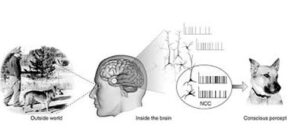
Just in the moment, very spontaneously, this unprompted
consciousness operates. Through practice, we develop the kind of
consciousness where giving becomes the natural expression of mind.
There are two kinds of consciousness which are involved in our actions. One is called “prompted consciousness”: the mind which considers and deliberates before acting. The other is called “unprompted,” and is very spontaneous. When a particular action has been cultivated, there is no longer the need to deliberate. Just in the moment, very spontaneously, this unprompted consciousness operates. Through practice, we develop the kind of consciousness where giving becomes the natural expression of mind.
Có hai loại tâm thức hiện diện trong mỗi hành động của ta. Một loại là tâm thức có tính cách thúc đẩy: đây là tâm suy nghĩ, tính toán, đắn đo trước mỗi hành động. Loại thứ hai là tâm thức tự nhiên, không khích động, nó là một thứ trực giác. Khi một hành động nào đã được ý thức kỹ lưỡng rồi, thì không cần thiết để đắn đo nữa. Loại tâm thức này hoạt động trong giây phút hiện tại một cách thật tự nhiên. Bằng sự thực hành, chúng ta sẽ khai triển loại tâm thức, mà trong đó sự bố thí chỉ là một biểu lộ tự nhiên của tâm mình.
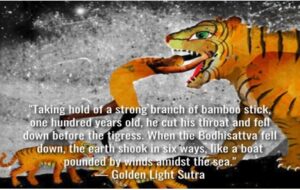
In one of the Buddha’s previous lives, when he was called
a “bodhisattva”, used his own body as kingly gift for mother tiger.
In one of the Buddha’s previous lives (when he was called a “bodhisattva,” meaning a being working towards enlightenment), he came to the top of a cliff and saw a tigress with two young cubs. The tigress was ill and had no milk to feed her cubs. Out of compassion for the tigress and her cubs, without regard for or identification with his own body, he threw himself off the cliff to be food for the tigress so she would be strong enough to give milk. A very kingly gift.
Trong một tiền kiếp của đức Phật, khi còn là một vị Bồ tát, một hôm ngài đi ngang qua một vách núi nọ, thấy một con cọp mẹ với hai con cọp nhỏ mới sanh. Cọp mẹ đang bệnh, không có đủ sữa cho hai đứa con mình bú. Với lòng từ bi, ngài quên đi sinh mạng của mình, gieo mình xuống vực núi, hy sinh than mình làm thực phẩm nuôi cọp mẹ, để nó có đủ sức khỏe lo cho hai đứa con. Ðây là một bố thí thuộc vào hạng vương đạo.
We may not reach that height of selflessness, but the story points the direction: to cultivate generosity out of compassion and love for all other beings. In many discourses, the Buddha urged people to practice giving until it becomes an effortless expression of understanding. Generosity is a great parami; it is listed as the first of the perfections of the Buddha. And as it is cultivated it becomes the cause of great happiness in our lives.
Chắc chúng ta chưa đạt đến mức vô ngã như thế, nhưng câu chuyện chỉ cho ta một hướng đi: vun trồng tâm bố thí vì lòng từ bi đối với tất cả chúng sanh. Trong nhiều bài pháp, đức Phật luôn khuyến khích ta hãy thực hành bố thí cho đến ngày nào nó trở thành một biểu hiện tự nhiên của sự hiểu biết. Bố thí là một đại ba la mật, nó được coi như là một đức đầu tiên trong sự toàn thiện của đức Phật. Và khi được vun trồng đầy đủ nó sẽ là nhân của những hạnh phúc lớn trong cuộc sống của chúng ta.

Following the five basic precepts: not killing, not stealing,
not committing sexual misconduct, not using wrong speech, and not
taking intoxicants which cloud the mind and make it dull.
The second pillar of the Dharma, or field of purifying action, is moral restraint. For people in the world, for householders, this means following the five basic precepts: not killing, not stealing, not committing sexual misconduct, not using wrong speech, and not taking intoxicants which cloud the mind and make it dull.
- Trụ thứ hai của giáo pháp, hay một lãnh vực hành động trong sạch, là giữ giới luật. Ðối với bậc cư sĩ thì nó có nghĩa là giữ ngũ giới: không sát sanh, không trộm cắp, không tà dâm, không vọng ngữ và không dùng những chất say nào có thể là mê mờ tâm mình.
All beings want to live and be happy; all beings want to be free of pain. It is a much lighter state of mind to preserve life than to destroy it. It feels so much better to gently remove an insect from inside our home and put it outside than to kill it. Having a reverence for all living things.
- Mọi chúng sanh đều muốn được sống và được an vui. Ai cũng không muốn mình bị khổ đau. Bảo vệ sự sống bao giờ cũng đem lại cho ta một tâm nhẹ nhàng,thư thái hơn là đi hủy hoại nó. Ðem một con ruồi ở trong nhà thả ra ngoài sân, bao giờ cũng làm cho ta thoải mái hơn là giết nó. Hãy tôn trọng mọi sự sống.

All beings want to be free of pain. It is a much lighter
state of mind to preserve life than to destroy it.
Not stealing means refraining from taking those things which are not given to us.
- Không trộm cắp có nghĩa là không lấy giữ những gì không phải là của mình.
Sexual misconduct can be most easily understood as refraining from those actions of sensuality which cause pain and harm to others, or turbulence or disturbance in ourselves.
- Không tà dâm có thể hiểu một cách dễ dàng là đừng làm những hành động sắc dục nào có thể gây hại, hay tổn thương cho người khác, hay tạo sự bất an, phiền não cho chính mình.
Refraining from wrong speech means not only telling the truth, but avoiding a lot of useless and frivolous talk. A lot of our time is spent in gossip. Things come to mind and we talk without considering their usefulness. Restraint of speech is very helpful in making the mind peaceful. Not using harsh or abusive language. Our speech should be gentle, cultivating harmony and unity between people.
- Không vọng ngữ không phải chỉ là không nói dối mà còn có nghĩa là tránh nói những câu chuyện vô ích, nhỏ mọn. Chúng ta thường bỏ rất nhiều thời giờ ra để bàn những lời đồn đại vô căn cứ. Chuyện đến trong đầu là ta cứ nói, mà không cần suy nghĩ xem chúng có ích lợi gì không. Kiểm soát được lời nói là một cách để giúp cho tâm mình được an vui. Ðừng nói những lời gây gổ hay chửi mắng. Lời nói của ta phải nhã nhặn, gây những hạt giống hòa ái và thân thiết giữa tất cả mọi người.
When walking on the path of enlightenment, toward freedom and clarity of mind, it is also not very helpful to take things which cloud the mind and make it dull. Often, too, carelessness which results from intoxication weakens our resolve to keep the other precepts.
- Trên con đường giác ngộ, hướng về sự tự do và sáng suốt, ta nên tránh dùng những chất gì có thể làm cho tâm mình bị mê mờvà chậm lụt. Nhiều khi vì sự bất cẩn khi ta say sưa, mà mình lại vô tình phạm những giới cấm khác.
The importance and value of the precepts is on many levels. They act as a protection for us, a guard against the creation of unwholesome karma. All of these acts from which we refrain involve motives of either greed, hatred or delusion, and are karmically productive of future pain and suffering. While mindfulness is still being developed and at times not yet very strong, the resolution to follow the precepts will serve as a reminder if we are about to commit some unskillful act. For example, you’re about to kill a mosquito, your hand is ready to swat it, and just at that moment the force of the precept to refrain from killing will become operative and be the cause of greater awareness.
Sự quan trọng và giá trị của những giới cấm có nhiều mức độ khác nhau. Giới cấm là một bảo vệ cho ta, giúp ta tránh khỏi tạo tác những ác nghiệp. Ta sẽ tránh không hành động vì lòng thâm, sân, si, bởi chúng là nhân của các quả khổ đau trong tương lai. Khi chánh niệm vẫn còn đang phát triển, chưa được vững mạnh, sự quyết tâm giữ gìn giới luật sẽ nhắc nhở mỗi khi chúng ta sắp làm một hành động bất thiện. Thí dụ như khi bạn sắp giết một con muỗi, tay bạn dơ lên sửa soạn đập xuống, thì ngay khi ấy giới cấm sát sanh sẽ khởi lên và trở thành một nhân của chánh niệm.
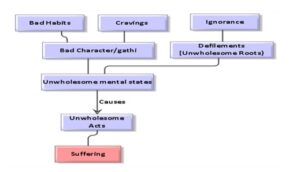
Every skillful action, every restraint from
unwholesome activity, causes lightness and clarity.
Unskillful actions also cause in the moment of doing then a heaviness and darkness in the mind. Every skillful action, every restraint from unwholesome activity, causes lightness and clarity. As you carefully observe the mind engaged in various activities you will begin to experience that any activity based on greed, hatred and delusion causes a heaviness to arise. Following these moral precepts as a rule for living keeps us light, and allows the mind to be open and clear. It is a much easier and less complicated way to live. At this level of understanding, the precepts are not taken as commandments but are followed for the effect they have on our quality of life. There is no sense of imposition at all because they are the natural expression of a clear mind.
Những hành động bất thiện sẽ tạo nên một trạng thái mê mờ, hắc ám trong tâm. Còn những hành động có ý thức, tự chủ không làm các hành động bất thiện, tạo cho ta một tâm nhẹ nhàng và sáng suốt. Khi bạn cẩn thận quan sát hoạt động của tâm trong mọi hành động, bạn sẽ bắt đầu kinh nghiệm được rằng, những việc làm do tham, sân, si sẽ khiến cho một tâm nặng nề khởi lên. Giữ giới luật như là một cách sống giúp cho ta được an lạc, tâm ta luôn cởi mở và trong sáng. Ðây là một lối sống thật thư thái và đơn giản. Hiểu được như vầy, thì giới luật không phải là những thiên lệnh, chúng ta giữ vì chúng có ảnh hưởng đến giá trị của cuộc sống. Chúng ta không cần phải thần thánh hóa chúng, vì chúng chỉ là những biểu hiện tự nhiên của một tâm trong sáng.
The precepts have an even more profound meaning on the spiritual path. They free the mind of remorse and anxiety. Guilt about past actions is not very helpful, and keeps the mind agitated. By establishing basic purity of action in the present the mind more easily becomes tranquil and one-pointed. Without concentration, insight is impossible. And so the foundation in morality becomes the basis of spiritual development.
Giới luật còn có một ý nghĩa sâu xa hơn thế nữa trên con đường tu tập. Chúng giải thoát tâm ta ra khỏi mọi hối hận và lo âu. Mặc cảm tội lỗi về những chuyện quá khứ không có ích lợi gì mấy, chúng chỉ làm cho ta lo buồn thêm. Bằng cách tạo dựng một căn bản trong sạch cho hành động của mình trong giây phút hiện tại, ta có thể giúp cho tâm mình trở nên thư thái và an tĩnh một cách dễ dàng. Không có định thì sẽ không bao giờ có tuệ được. Vì thế cho nên, nền tảng giới luật là một căn bản vô cùng cần thiết trên con đường tu tập.
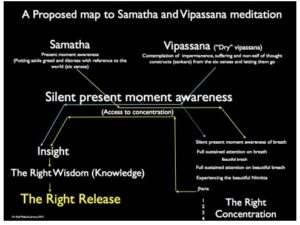
Samatha (tranquility) and Vipassana (insight)
Meditation: The bottom-line is don’t debate, just do it!
The third field of purifying activity is meditation. Meditation is divided into two mainstreams. The first is the development of concentration, the ability of the mind to stay steady on an object, without wavering and wandering. When the mind is concentrated, there is a great power of penetration. The mind that is scattered cannot see into the nature of the mind and body. A certain degree of one-pointedness is essential to the growth of wisdom. But concentration by itself is not enough. That strong force in the mind has to be employed in the service of understanding, which is the second kind of meditation: the cultivation of insight. That means seeing clearly the process of things, the nature of all dharmas. Everything is impermanent and in flow, arising and passing away moment to moment. Consciousness, the object, all the different mental factors, the body: all phenomena share in the flow of impermanence. When the mind is clear it experiences this ceaseless change on a microscopic level: instant to instant we are being born and dying. There is nothing to hold onto, nothing to grasp at. No state of mind or body, no situation outside ourselves is to be grasped at, because it is all changing in the moment. The development of insight means experiencing the flow of impermanence within ourselves so that we begin to let go, not grasping so desperately at mind-body phenomena.
- Lãnh vực thứ ba của hành động trong sạch là thiền. Thiền được chia ra làm hai dòng chánh. Thứ nhất là thiền Chỉ hay định, là khả năng tập trung tâm mình vào một đối tượng duy nhất trong một thời gian, mà không hề lo ra hay lơ đãng. Khi tâm ta tập trung, nhất như, nó sẽ có một khả năng soi thấu rất mãnh liệt. Một tâm ý tán loạn không thể nào nhìn thấy được tự thể của thân và tâm. Sự khai triển trí huệ đòi hỏi tâm ta phải có một mức định tối thiểu nào đó. Nhưng định không thôi cũng chưa đủ. Sức mạnh của tâm phải được sử dụng để phục vụ cho sự hiểu biết, đó là loại thiền thứ hai: thiền quán. Quán có nghĩa là nhìn thấy rõ được chân tướng của mọi hiện tượng, tự tính của vạn pháp. Mọi vật đều vô thường và luôn luôn biến chuyển, sanh diệt trong mỗi giây phút. Tâm thức, đối tượng, các tâm hành, thân: mọi hiện tượng đều nằm trong dòng sông vô thường. Khi tâm ta sáng suốt, nó có thể kinh nghiệm được sự biến chuyển liên tục này trên một bình diện thật vi tế: trong mỗi sát na chúng ta đang chết đi và được sanh ra. Không có gì để nắm giữ, chẳng có gì để níu kéo. Không có một trạng thái nào của tâm hay thân, không có hoàn cảnh nào bên ngoài ta để bám víu, bởi vì tất cả đều thay đổi ngay trong giây phút này. Sự phát triển trí tuệ có nghĩa là kinh nghiệm được dòng vô thường nơi chính ta, để ta bắt đầu sự buông bỏ, không còn mù quáng ôm chấp vào tiến trình thân tâm.
Experiencing impermanence leads to an understanding of the inherent unsatisfactoriness of the mind-body process: unsatisfactory in the sense that it is incapable of giving any lasting happiness. If we think that the body is going to be the cause of our permanent peace and happiness and joy, then we’re not seeing the inevitable decay that’s going to occur. As we begin to get old and diseased and decay and die, people with a strong attachment to the body will experience great suffering. Inherent in all things which arise is decay. All the elements of matter, all the elements of mind, are arising and vanishing.
Kinh nghiệm được vô thường, đưa đến một hiểu biết về sự bất mãn bẩm sinh của tiến trình thân tâm: bất mãn vì nó không có khả năng đem lại cho ta một hạnh phúc nào vĩnh viễn. Nếu chúng ta cho rằng thân của mình là một nguồn gốc của một hạnh phúc, an lạc thường hằng, tức là ta chưa thấy được sự hủy hoại không thể nào tránh khỏi của nó. Khi ta trở nên già, bệnh tật, tàn hoại và chết đi, những ai quyến luyến thân này sẽ rất khổ đau. Bản chất của bất cứ một vật nào sanh lên là sẽ tàn hoại đi. Mọi yếu tố của thân,mọi yếu tố của tâm đều đang sanh lên và diệt đi trong ngay giây phút này.
The third characteristic of all existence which is seen very clearly with the development of insight and awareness is that in all this flow of phenomena there is no such thing as an “I,” or “self, “a “me,” or “mine.” It is all impersonal phenomena flowing on, empty phenomena, empty of self. There is no entity behind it all who is experiencing it. The experiencer, the knower, is itself part of the process. As insight is cultivated through the practice of mindfulness, these three characteristics of existence are revealed.
Ðặc tánh thứ ba của hiện hữu, dưới sự quán sát của trí tuệ và chánh niệm, là trong dòng hiện tượng này không có một cái gì là “Tôi”, “Ngã” hay là “của tôi” hết. Tất cả chỉ là một dòng hiện tượng vô ngã, trống rỗng. Không có một thực thể nào đứng phía sau những hiện tượng ấy để kinh nghiệm. Cá nhân, chủ thể, tự nó cũng chỉ là một phần của tiến trình. Nếu ta biệt vun trồng trí tuệ bằng chánh niệm, ba đặc tính này của hiện hữu sẽ tự nhiên hiển lộ.
Suppose you have a pond of water which is filled with weeds. Practicing moral restraint is like going down to the water and pushing the weeds aside to get a handful to drink. The weeds are still present, and when you take your hand away, once again they come back and cover the pond. In moments of moral behavior, the mind is pure, but as soon as we are forgetful, the defilements are there again. If you build a fence in the pond which keeps all the weeds on the outside, the water within remains clear to drink for as long as the fence is there. But the weeds are still on the outside and if the fence is removed the weeds come back. That’s like the force of concentration in the mind. It suppresses all the defilements. Insight or wisdom is like going down to the pond and pulling out the weeds: you pull one out and then another until the whole pond is clear. When removed in that way, they do not come back. Insight is a purification process: when all the negativities in our mind have been looked at, examined, and finally uprooted, they do not arise again.
Giả sử bạn có một hồ nước, trong hồ mọc đầy cỏ dại. Giữ giới luật cũng giống như cúi xuống, lấy tay vẹt cỏ ra hai bên để lấy nước uống. Cỏ dại vẫn còn đó, và khi bạn lấy tay ra, chúng sẽ trở lại phủ đầy mặt hồ. Những khi ta giữ giới luật tâm ta trở nên trong sạch, nhưng vừa khi chúng ta quên lãng, những dơ bẩn, ô uế sẽ trở lại với ta. Nếu bạn xây một hàng rào trong bờ hồ, ngăn chận những cỏ dại rong rêu ra chung quanh, nước bên trong sẽ trong sạch và có thể dùng được, vì sự có mặt của hàng rào. Nhưng những cỏ dại vẫn còn ở đó chung quanh và nếu ta dời hàng rào đi nơi khác, chúng lại sẽ lan tràn như xưa. Nó cũng giống như định lực trong tâm. Ðịnh có khả năng đè nén những tâm hành bất thiện xuống. Còn trí tuệ cũng giống như khi ta bước xuống hồ và nhổ đi những cỏ dại, từng cái một, cho đến khi cả hồ được trong sạch. Khi ta nhổ như thế thì chúng sẽ không còn mọc trở lại nữa. Trí tuệ là một phương pháp thanh lọc: khi những sự bất thiện trong tâm được quán chiếu cặn kẻ và cuối cùng bị bứng nhổ, chúng sẽ không còn khởi lên được nữa.

Wisdom is the culmination of the spiritual path, which
starts with the practice of generosity, moral restraint, and the
development of concentration. From that base of purity comes
penetrating insight into the nature of the mind and body.
Wisdom is the culmination of the spiritual path, which starts with the practice of generosity, moral restraint, and the development of concentration. From that base of purity comes penetrating insight into the nature of the mind and body. By being perfectly aware in the moment, all that has-been accumulated in our minds begins to surface. All the thoughts and emotions, all the ill will and greed and desire, all the lust, all the love, all the energy, all the confidence and joy, everything that is within our minds begins to be brought to the conscious level. And through the practice of mindfulness, of not clinging, not condemning, not identifying with anything, the mind becomes lighter and freer.
Trí tuệ là điểm cao tột nhất trên con đường tu tập. Nó được bắt đầu bằng sự thực hành bố thí, giữ giới và phát triển định lực. Từ căn bản trong sạch ấy, phát sanh một trí tuệ có khả năng soi thấu được thực chất của than và tâm. Bằng cách giữ chánh niệm hoàn toàn trong giây phút hiện tại, những gì huân tập trong tâm ta từ bấy lâu nay sẽ bắt đầu hiển lộ. Mọi tư tưởng, mọi tà ý, tham dục, luyến ái, tình yêu, nghị lực, mọi niềm vui, tất cả những gì trong phạm vi tâm sẽ được mang lên bình diện nhận thức. Và bằng sự thực hành chánh niệm, không dính mắc, không ghét bỏ, không nhận một đối tượng nào làm mình, tâm ta sẽ trở nên thư thái và tự tại.
An indication of the relative power of these various fields of parami was given by the Buddha. He said that the power of purification in giving is augmented by the purity of the receiver. But many times, more powerful even than having made an offering to the Buddha himself or the entire order of enlightened monks and nuns is to practice the thought of loving kindness with a concentrated mind. A yet more potent than cultivating that loving thought is clearly seeing the impermanence of all phenomena, because itis this insight into impermanence which is the beginning of freedom.
Ðức Phật có nói về sức mạnh của các Ba la mật này. Ngài nói rằng sức mạnh của bố thí sẽ được gia tăng bằng sự trong sạch của người nhận. Và thực hành từ bi quán với một định tâm còn hùng mạnh hơn là cúng dường Phật và toàn thể tăng đoàn của ngài gấp bội lần. Nhưng dũng mãnh hơn vun trồng những tư tưởng từ bi ấy, là thấy được sự vô thườngtrong mọi hiện tượng, vì thấy được vô thường tức là bắt đầu của sự giải thoát.
*** *** ***
Question: For a while I found myself giving too much away; I got very strung out on giving. Could you talk about the nature of giving when it leads to feeling strung out?
Hỏi: Có một lúc tôi cảm thấy mình cho nhiều quá; tôi cảm thấy như mình bị lợi dụng. Ông có thể nói thêm về bản chất của bố thí khi nó đưa đến việc mình cảm thấy bị lạm dụng không?

As we practice giving it becomes increasingly spontaneous.
And when it develops with that balance, then it’s harmonious,
and there is no regret which follows.
Answer: We all are at different levels. We’re not all at the level of the bodhisattva who gave his life to feed the tiger and her cubs. There might be a momentary impulse to do something like that followed by many moments of regret. That is not skillful. We have to be sensitive to where we are in the present moment and cultivate generosity which feels appropriate. It grows. As we practice giving it becomes increasingly spontaneous. And when it develops with that balance, then it’s harmonious, and there is no regret which follows.
Ðáp: Chúng ta đều có những trình độ khác nhau. Chúng ta không phải đang ở trình độ của một vị Bồ tát dám hy sinh thân mình để nuôi cọp mẹ và hai đứa con của nó. Có thể đôi khi ta có những thúc dục để làm những chuyện như vậy, để rồi theo sau là những hối hận. Ðó không phải là một phương pháp thiện xảo. Chúng ta phải ý thức được trong giờ phút này mình đang ở đâu và vun trồng sự bố thí sao cho thích hợp với mình. Nó sẽ phát triển. Khi chúng ta thực hành bố thí, thì dần dần nó sẽ trở nên tự nhiên. Và khi ta đạt được một sự quân bình, nó sẽ trở thành hòa hợp, không có một mảy may hối tiếc nào theo sau cả.
Question: The precepts can be a guide for a certain level but is there a danger of clinging to them? Can’t they become a hindrance because they are concepts? There may be actions arising out of compassion which will be against the precepts like lying to spare somebody. What happens when the precepts and intuition conflict?
Hỏi: Những giới luật có thể là sự chỉ đạo ở một trình độ nào đó, nhưng chấp cứng vào nó có nguy hiểm không? Giới cũng có thể là một trở ngại vì dù sao thì nó cũng chỉ là những ý niệm? Có những hành động có thể vì lòng từ bi nhưng lại phạm giới, như là nói dối để cứu một người nào. Khi giới luật và trực giác xung khắc với nhau thì sao?
Answer: All these fields of purifying activity are very much to be understood in terms of the mental factors they’re cultivating, not the action itself. If we do an action out of compassion, then it’s wholesome. But often we’re not at that place of awareness where we can perceive all the factors involved in every activity. Until we reach the level of sensitivity where we’re really tuned into every motivating aspect of our actions, where we can determine whether it’s skillful or unskillful, the precepts serve as a very useful guideline. A monk once came to the Buddha and said he couldn’t remember the more than 200 rules necessary for the monks, much less follow them. The Buddha said, “Can you remember one rule?” and the monk said he thought he could. The Buddha said, “Be mindful.” Everything else comes out of that awareness. If you’re very mindful, automatically there’s right action.
Ðáp: Tất cả các hành động thiện phải được hiểu theo những tâm hành mà chúng đang vun trồng, chứ không phải tự ở những hành động đó. Nếu chúng ta hành động vì lòng từ bi thì đó là hành vi thiện. Nhưng thường thì chúng ta chưa tới trình độ tỉnh thức đủ để mình có thể nhận thấy mọi yếu tố liên quan đến hành động của mình. Chừng nào ta có thể ý thức được mọi động lực khiến ta hành động, để nhận định thiện ác, các giới luật vẫn được coi như là những quy tắc rất hữu ích. Một vị sư đến than phiền với đức Phật rằng ông không thể nào nhớ hết hơn hai trăm giới luật dành cho các Tăng, chứ đừng nói gì đến việc giữ cho đừng phạm. Ðức Phật nói: “Vậy ông có thể nhớ được một giới luật thôi không?” Vị Tăng trả lời rằng ông có thể nhớ được. Ðức Phật nói tiếp: “Giữ chánh niệm!” Mọi điều khác đều đến từ chỗ chánh niệm. Nếu bạn có thể giữ chánh niệm cho tinh chuyên, tự nhiên mọi hành động sẽ trở thành chân chánh.
Question: I see a conflict between being a kingly giver and being secure in the world.
Hỏi: Tôi thấy có một sự xung đột giữa việc theo con đường bố thí vương đạo và có một cuộc sống được bảo đảm.

The cultivation of kingly giving does not necessarily mean
that we go out and give everything away. It means giving with a
great openness, appropriate to the situation.
Answer: The cultivation of kingly giving does not necessarily mean that we go out and give everything away. It means giving with a great openness, appropriate to the situation. We have a certain responsibility to ourselves to keep things together so we can continue the practice and cultivate the factors of enlightenment. The level of giving will very much depend upon the particular evolution of mind. There should not be an image of how one should be giving, and then trying to live up to that image. Simply, in the present moment, take opportunities to cultivate the factor of non-greed. It’s not complicated, let it unfold by itself. When it gets to the point where you’re ready to fling yourself over a cliff to feed the tigers, you will.
Ðáp: Sự vun trồng bố thí theo vương đạo không cần thiết có nghĩa là ta ra đường cho hết tài sản của mình cho kẻ khác. Nó chỉ có nghĩa là ta bố thí với một tâm đại lượng, thích hợp với hoàn cảnh. Chúng ta cũng có trách nhiệm đối với chính mình, phải biết duy trì một mức sống vừa đủ để mình có thể tu tâm và vun trống những yếu tố giác ngộ. Mức độ của sự bố thí sẽ tùy thuộc vào rất nhiều trình độ tiến hóa của tâm mình. Chúng ta không nên có một ý niệm cứng ngắc về sự bố thí rồi tự cưỡng ép, cố gắng sống theo như vậy. Chỉ cần giản dị, trong giây phút hiện
tại, chụp lấy những cơ hội để vun trồng tâm hành vô tham. Nó không phức tạp gì đâu, hãy để nó tự nhiên hiển lộ. Ðến khi nào bạn cảm thấy sẵn sàng gieo mình xuống vực thẳm để nuôi những con cọp, bạn sẽ làm chuyện ấy.
Question: I’m a little confused about not lying. When you don’t verbalize something that you’re thinking that seems truthful and appropriate to the situation, is that considered lying?
Hỏi: Tôi cảm thấy hơi bối rối về việc nói láo. Khi ta không lên tiếng nói những gì mà ta nghĩ rằng nó chân thật và thích hợp với hoàn cảnh, như vậy có gọi là nói láo không?
Answer: There could be something true, a true perception, which would not be of help to another person perhaps because they were not in a place where they could hear it. We should speak the truth when it is useful. It’s beautiful and peaceful to stay in a place of silence of mind. But that takes a lot of mindfulness because we’re very conditioned to a lot of talk. The words come out before we are even aware that there was an intention to do so. It’s all very mechanical. But as the mindfulness gets sharper, we begin to be aware before talking—the intention to speak arises and we’re mindful of it. Then we can begin to see both whether it’s truthful and also useful.
Ðáp: Có những việc có thể là sự thật, một ý niệm chân chánh, nhưng nó không có ích lợi gì cho người khác, bởi vì người ấy không ở vào một địa vị mà họ có thể nghe và hiểu được. Chúng ta chỉ nên nói sự thật khi nào nó có ích lợi. Sống với sự thinh lặng tâm ý rất là đẹp và an lạc. Nhưng điều ấy đòi hỏi nhiều chánh niệm, vì chúng ta rất dễ bị lôi cuốn để nói. Lời nói thoát ra ngay cả trước khi mình ý thức được rằng mình có điều gì muốn nói. Chúng rất là máy móc. Nhưng khi chánh niệm được giũa mài sắc bén, chúng ta sẽ bắt đầu có ý thức trước khi mình nói – tác ý muốn nói khởi lên và ta lập tức có chánh niệm về nó. Và khi ấy ta có thể nhận xét rằng chúng có thân thật và có ích lợi gì không.
Sources:
Tài liệu tham khảo:
- https://theravada.vn/ba-muoi-ngay-thien-quan-loi-mo-dau/
- https://tienvnguyen.net/images/file/lHJ4Mqq01wgQAPRx/30-ngaythienquan.pdf
- https://www.tienvnguyen.net/images/file/8hKjNaq01wgQAKJW/the-experience-of-insight.pdf
- Photo 2: http://evdhamma.org/index.php/sutras-books/30ngay-tapthien-minhsat/item/1255-ninthevening-ngutrancai-song-ngu
- Photo 3: http://evdhamma.org/index.php/dharma/dharma-lessons/item/1075-niet-ban-phat-giao-song-ngu
- Photo 4: http://evdhamma.org/index.php/documents/buddhist-meditation/item/82-long-tu-nhu-bien-song-ngu
- Photo 5: https://mx1414.wordpress.com/2018/03/11/the-blessing-of-generosity/three-types-of-givers/
- Photo 6: https://en.wikipedia.org/wiki/Consciousness
- Photo 7: https://www.facebook.com/BuddhaWeekly/photos/the-famous-story-of-buddha-previous-incarnation-feeding-himself-to-the-starving-/1325478624274846/
- Photo 8: http://evdhamma.org/index.php/buddhist-study/buddhist-study-2/item/386-bai-so-30-su-quan-trong-cua-giu-gioi-song-ngu
- Photo 9: http://evdhamma.org/index.php/buddhist-study/buddhist-study-2/item/386-bai-so-30-su-quan-trong-cua-giu-gioi-song-ngu
- Photo 10: http://evdhamma.org/index.php/dharma/dharma-lessons/item/1084-hieu-ve-tam-song-ngu
- Photo 11: http://wisdomthroughmindfulness.blogspot.com/2012/11/samatha-and-vipassa-meditataion.html
- Photo 12: http://evdhamma.org/index.php/dharma/dharma-lessons/item/312-67-long-tu-nhu-bien-song-ngu
- Photo 13: http://evdhamma.org/index.php/parables/anguttara-parables/item/107-15-qua-tang-ve-thuc-pham-song-ngu
- Photo 14: http://goodsamaritan-ministry.org/the-milk-of-human-kindness-click-to-view-more-pics/
